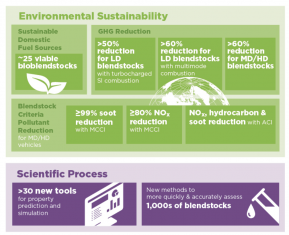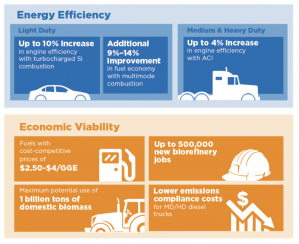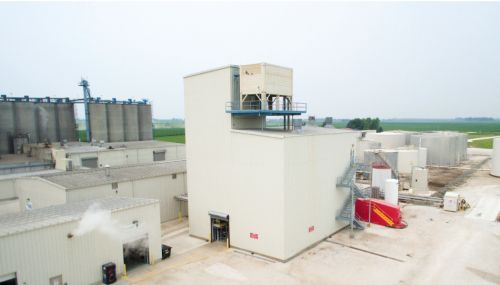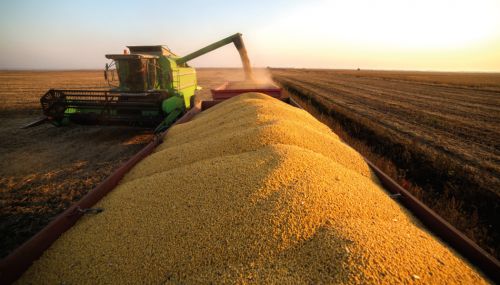All
On the Road to Net-Zero Transportation
by Trevor Smith, U.S. Department of Energy

Federal government report shows how renewable liquid fuels can meet 100% of future U.S. demand for air, marine, rail and long-haul freight
Climate change is speeding up, along with the urgency to cut greenhouse gas (GHG) emissions responsible for global warming. At the same time, car, truck, and train wheels keep turning, while planes and boats take to the skies and oceans — releasing 1.5 billion tons of GHGs into the atmosphere every year.
Breakthroughs from the U.S. Department of Energy (DOE) Co-Optimization of Fuels & Engines (Co-Optima) initiative will help rapidly cut emissions, reduce dependence on international petroleum, and contribute to ambitious national goals to slow global warming on the land, in the air, and across the water. While previous research focused on either the fuel or the engine, the Co-Optima team examined synergies provided by co-optimizing potential fuels with advanced engine technologies. Findings from the six-year collaborative undertaking are now available in a recently released report.

Top researchers from national labs across the country set out to give American industry and policymakers the scientific knowledge, data, and tools needed to decide which new fuel-engine combinations for vehicles could most realistically benefit drivers, businesses, and the environment. On their own, bio-based fuels and advanced engines can deliver modest fuel economy and environmental advantages. When those new fuels and engines are designed to work together, even more meaningful improvements are possible.

Efficient, pollution-reducing fuels and engine technologies identified by Co-Optima researchers for use in on-road light-, medium-, and heavy-duty vehicles could also cut pollution from marine, rail, off-road, and airplane engines.
Co-Optima research revealed ways to improve fuel economy by 10% for today’s turbocharged car engines with new fuel options. Improved fuels combined with advanced engines were shown to deliver up to an extra 14% increase in fuel economy. Plus, researchers identified domestically sourced, bio-based fuels that produce 60% fewer GHG emissions than those generated by petroleum-based fuels when used in on-road vehicles. The scientists also explain how 99% of some of the most harmful freight truck criteria pollutants could be eliminated.
The combination of sustainable fuels uncovered by Co-Optima research with engines for hybrid electric vehicles can reduce carbon and other pollutant emissions of vehicles now, while enabling a faster transition to net-zero-carbon emissions for on-road transportation in the future. Fuels produced from the same biomass — such as forestry and agricultural byproducts, algae, discarded cooking oil, and even manure — could eventually meet 100% of future demand for air, marine, and rail fuel. That would still leave enough to meet the fuel needs of long-haul freight trucks that are harder to electrify.
By reducing criteria pollutant and GHG emissions, Co-Optima approaches can also diminish the concentration of poor air quality near highways and transportation hubs frequently located near underserved populations. This can help limit the impact of climate change on vulnerable communities. In addition, biofuel production can boost the economy and create jobs in rural areas.
Co-Optima researchers focused on identifying and understanding fuel components known as blendstocks, which can be combined with affordable petroleum-based fuels to improve vehicles’ carbon footprint and engine performance. The team screened more than 1,000 options to pinpoint high-performing blendstocks that could potentially be produced at commercial scale from the estimated billion-ton annual supply of domestic biomass resources. Along the way, Co-Optima scientists, engineers, and analysts also invented new methods and tools to expand understanding of combustion and fuel properties.
While discoveries from the Co-Optima team provide a solid foundation for emissions reduction in the near term, challenges remain as industry and the nation as a whole take up the effort to reach net-zero emissions by 2050. Research by manufacturers is still needed to determine what more significant changes in engine operation and component materials will be needed to approve use of these sustainable Co-Optima fuels in commercial engines.
Additional R&D could result in new engine modifications beyond those considered by Co-Optima researchers, delivering even lower costs, lower emissions, and higher efficiency. Ultimately, the new fuels and engines identified through Co-Optima research will burn cleaner, produce fewer lifecycle GHG emissions, and make important contributions to the nation’s transition to a net-zero-carbon-emissions energy future.
Trevor Smith is a Technology Manager for the Conversion Program in the Bioenergy Technologies Office at the U.S. Department of Energy. The Co-Optima report can be read at energy.gov/node/4820186. A summary is available at energy.gov/node/4820184.
Related Posts
 Why Quality Matters in Your Biofuel Blends
Why Quality Matters in Your Biofuel Blends
Posted on June 25, 2025
 Incorporating Higher Blends of Biofuels
Incorporating Higher Blends of Biofuels
Posted on May 14, 2025
 NORA Programs at Eastern Energy Expo
NORA Programs at Eastern Energy Expo
Posted on May 13, 2025
 March Short-Term Energy Outlook
March Short-Term Energy Outlook
Posted on April 28, 2025
Enter your email to receive important news and article updates.
